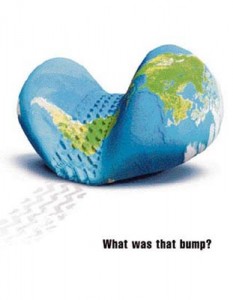I strongly believe that the commitments resulting from the Copenhagen Conference will revolve around trade. People, countries, and the world think in terms of money; people will not simply start caring about the environment overnight. Therefore, any outcome of Copenhagen must put into financial terms in order to have nations understand the full gravity of the situation and, hopefully, their commitment.

I see the producer-pays as an intrinsic flaw in the environmental aspect of international trading; our current situation cannot be remedied without consumers bearing some responsibility in GHG emissions. Climate change is now a fact of life, an issue that can be dealt with now or later with a variety of possible consequences. Many countries are fretting over the economic downturn and how environmental regulation is going to hamper GDPs and further growth of economies. Like the first line of the foreword of Baument quoted: “We can draw lessons from the past but we can’t live in it” (LBJ). It seems to me that the world needs to face the reality that the economy isn’t going to be as good as before. We simply cannot continue to consume in our present manner.
Perhaps this is why I was shocked to learn that producers carry the full burden of GHG emissions. Under the current system, international trade creates a Catch-22 for developing countries: they are forced to pick between the economic wellbeing of their country and people, and the environment. No wonder China and India are resisting these measures: they are the countries that welcome factories of the Western outsourced companies! If the Copenhagen Conference is going to accomplish anything, I hope that it creates a mechanism that more evenly distributes the economic and GHG emission price on the consuming country. If the U.S. consumer had to take responsibility for half of the GHG emissions from everything imported from China and India, the environment would be a much healthier place merely because the U.S. would not allow as many goods to be imported. These factories will not produce things (and subsequently pollute) if we do not buy. We cannot pin the emissions on a developing country that is industrializing; we have to look at how we operate and stop putting the blame on those who are only partially responsible.
Tags: accountability, consumer accountability, consumerism, equalizing trade mechanisms, trade

